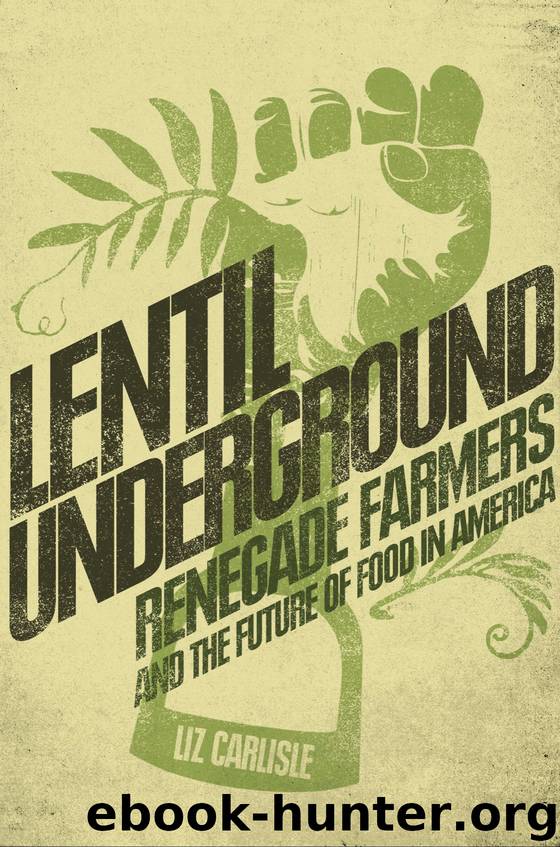Lentil Underground by Liz Carlisle

Author:Liz Carlisle
Language: eng
Format: epub
Publisher: Penguin Publishing Group
Published: 2015-01-08T16:00:00+00:00
CREATIVE CAPITAL
Dave liked the idea of buffering his growers from the layered uncertainties of (1) farming (2) specialty (3) organic crops. But the problem was, Timeless Seeds didn’t have enough of a buffer from those uncertainties itself. Because Dave and his three farmer partners had launched the company at a time when organic food was not considered a legitimate business model in Montana, they’d never properly capitalized. Since none of them had money and banks wouldn’t lend to them, they couldn’t set up Timeless Seeds as a formal cooperative, even though they were sharing time, money, and equipment. So the Timeless boys had chartered the business as a Montana C Corporation and raised money from friends who’d chosen more lucrative occupations. Those friends—mostly AERO members—had become shareholders in the new “corporation,” whose dividends consisted of a Christmas package of lentils every few years. In the days before Kickstarter, when the Internet was still in its infancy, crowd-funding depended on being able to locate an actual crowd—the very thing north-central Montana was known for not having.
Still functioning like a young start-up after twenty-five years in business, Timeless Seeds’ biggest handicap was that they didn’t have a line of credit. Operating exclusively on cash flow, the shoestring company’s only option was “pay as you can,” and certain times of the season were leaner than others. Dave hated to see tardy checks and unpredictable delivery schedules stretch farmers’ tight budgets, and he was open to establishing penalties for late payment and delivery. The risk of a CSA-style contract, however, was more than he could absorb. The scale of his growers’ operations—determined to some extent by the scale of the farm economy around them, from which they were never wholly independent—was simply too large in relation to the size of his business. “It would be neat to do what the pasta company does,” Dave said to the Crabtrees, “but you’ve got to have a lot of money to do that. You have to be able to spread it out over lots of growers. It could kill us if a grower got hailed out and we still had to pay them.”
The prospect of a predetermined schedule for cleaning and storing each type of lentil, one variety at a time, posed a similar difficulty. Given Timeless Seeds’ limited operating budget, the company didn’t have enough money to buy ahead on its thirty products—or enough warehouse space to store extra inventory. So Dave attempted to schedule deliveries from growers according to orders from buyers, which were maddeningly hard to predict. Restaurants, in particular, tended to place small, mixed orders, which fluctuated wildly according to food trends and consumer taste. Specialty distributors were just one step up the food chain from restaurants, chasing the same trends—and neither were eager to store extra product in their own warehouses, which were often located in high-rent areas like New York or San Francisco.
Timeless Seeds’ diverse customer base was part of what made the company resilient, but it was also a source of uncertainty in its own right.
Download
This site does not store any files on its server. We only index and link to content provided by other sites. Please contact the content providers to delete copyright contents if any and email us, we'll remove relevant links or contents immediately.
Craft Beer for the Homebrewer by Michael Agnew(17475)
Marijuana Grower's Handbook by Ed Rosenthal(3144)
Barkskins by Annie Proulx(2897)
Project Animal Farm: An Accidental Journey into the Secret World of Farming and the Truth About Our Food by Sonia Faruqi(2676)
Red Famine: Stalin's War on Ukraine by Anne Applebaum(2485)
The Plant Messiah by Carlos Magdalena(2469)
Organic Mushroom Farming and Mycoremediation by Tradd Cotter(2319)
0041152001443424520 .pdf by Unknown(2242)
In the Woods by Tana French(2025)
Beer is proof God loves us by Charles W. Bamforth(1948)
The Art of Making Gelato by Morgan Morano(1909)
Meathooked by Marta Zaraska(1906)
Birds, Beasts and Relatives by Gerald Durrell(1882)
Reservoir 13 by Jon McGregor(1864)
The 7 Habits of Highly Effective People: Powerful Lessons in Personal Change (25th Anniversary Edition) by Covey Stephen R(1849)
Borders by unknow(1799)
The Lean Farm Guide to Growing Vegetables: More In-Depth Lean Techniques for Efficient Organic Production by Ben Hartman(1795)
The 7 Habits of Highly Effective People: Powerful Lessons in Personal Change by Stephen R. Covey(1778)
Urban Farming by Thomas Fox(1761)
